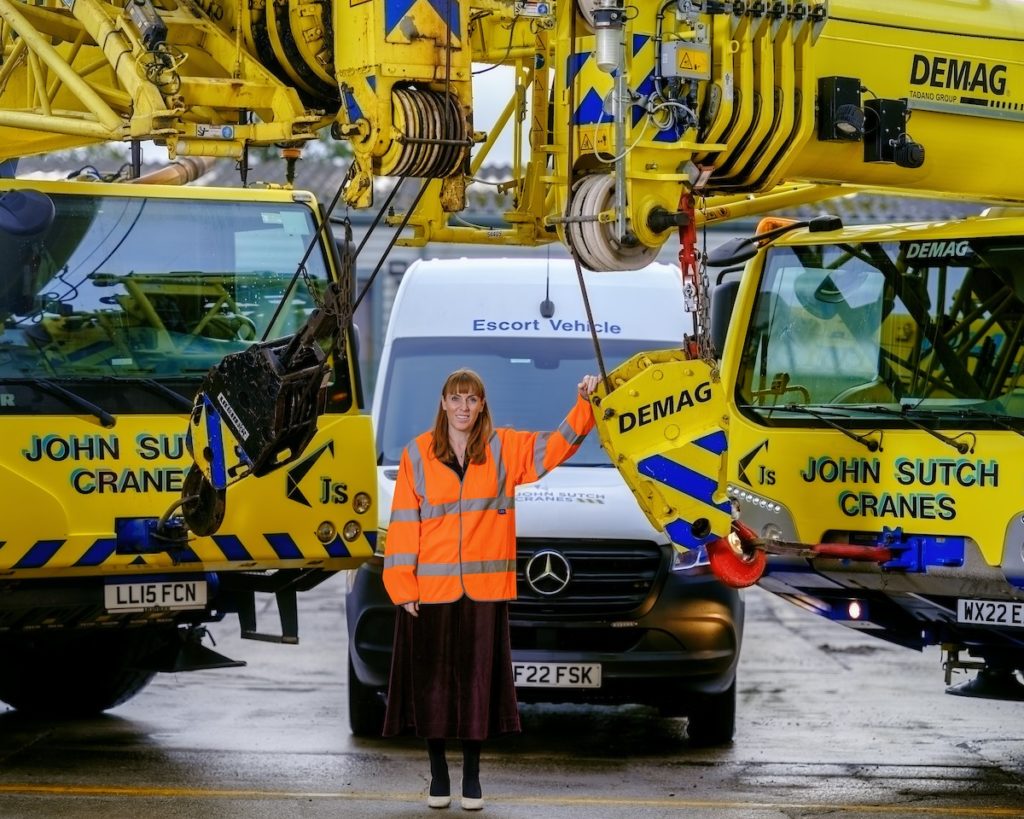The construction industry has high hopes the deputy prime minister Angela Rayner will help them make it easier to get essential equipment such as cranes to building sites. The optimism follows a meeting between Ms Rayner and the managing director of a crane company based in her constituency.
- Police forces vary in how they apply the rules
- ‘Adverse weather’ conditions need to be defined
- Notification of travel periods too long
Random embargos on crane transport set to end
The deputy prime minister, Angela Rayner, has pledged to revise restrictions on movements of cranes and other heavy equipment.
Ms Rayner, who is also secretary of state for housing, communities and local government, said she would lead cross-departmental discussions to address the broader implications of the issue.
The promise follows a meeting with Hayley Sutch, the managing director of a crane company based in Ms Rayner’s Ashton-under-Lyme constituency last week. Ms Sutch highlighted that cranes would play an important for achieving the government’s 1.5m new homes target.
Paul Parry, sales director of John Sutch Cranes, said: “It was a very productive meeting and went further than we originally thought it would.”
Ms Rayner heard about the plant hire industry’s frustration over different police forces’interpretation of regulations applying to the movement of abnormal loads.
“There are 43 police forces in England and Wales with some more vigorous than others on enforcement. A lot of embargoes prevent overnight transport of equipment,” said Mr Parry.
For example, some police forces in England have imposed travel bans on the dates of Scottish bank holidays.
West Midlands and Greater Manchester forces were cited as applying the regulations in a particularly restrictive way.
Mr Parrysaid that interpretation of adverse weather varies with Lincolnshire police regarding heavy rain as a sufficient reason to impose a ban.
The Construction Plant-hire Association, CPA, said that currently there was no definitive definition as to what constituted ‘adverse weather’.
Notification periods are too long
Mr Parry added that the current requirements of two days’ notice for equipment under 80 tonnes and five days for loads over that weight were too long.
“We used to be a 24/7 hour business now we need a minimum of three days before we can get a crane to someone. Our customers often call due to unforeseen circumstances such as a pump going down which might stop work on the whole site.”
Travel embargos are frequently from 6.30am until 10am and 4pm until 6.30pm creating delays that are adding to construction costs.
The Construction Plant-hire Association, CPA, has said this cuts across typical building site opening times of 8am until 4pm.
Lack of uniformity over required notification with differing police force interpretations on whether bank holidays in Scotland counted or not was problematic.
CPA policy manager Chris Cassley said: “The overwhelming challenge is to have consistency among the police forces on the application and guidance of the regulations.”
The National Police Chiefs Council is reviewing guidance on special types general order 2003 regulations on transporting abnormal loads. The new guidance is expected to be out by the end of 2024.
Finance brokers Hank Zarihs Associates said development finance lenders were keen to see a more consistent and flexible approach.
The brokerage added that delays in moving cranes and abnormal loads adversely affected the supply chain and delivery time scales.
LinkedIn Question: What difference would a more flexible and consistent interpretation of regulations concerning the movement of cranes and other heavy equipment make?












